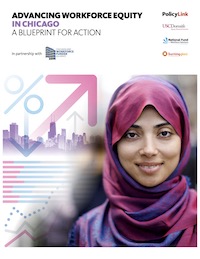In the Chicagoland area, as in the rest of the nation, deep racial inequities are built into the regional economy. Occupational segregation is stark, and the growth of good jobs over the next ten years will be concentrated among White workers. Just two out of ten occupations projected to add the most Black workers and none of the ten occupations projected to add the most Latinx workers are good jobs.
Deeply entrenched racial inequity cost the region $136 billion in unrealized GDP in 2018 alone. Disparities in the system are felt by the whole region, and workers of color are bearing the burden.
This report, produced in partnership with PolicyLink, Burning Glass Technologies, and the Chicagoland Workforce Funder Alliance, offers a comprehensive analysis of long-standing racial gaps in labor market outcomes, the economic impacts of Covid-19, and the racial equity implications of automation.
The report provides a blueprint for action to advance workforce equity informed by the data and driven by local leaders.
In support of building a thriving and inclusive workforce, the report offers recommendations for workforce stakeholders in the Chicago region, including the following:
- Use sector-based strategies to get more workers of color into good jobs by building career paths from entry-level jobs to good jobs that meet the needs of employers and buoy the regional economy.
- Encourage public policy that raises the floor on job quality in terms of wages, benefits, and worker protections.
- Support workers of color to take advantage of job opportunities by expanding access to childcare, transportation, and safe, affordable housing.
- Ensure workers are part of the conversation and have a voice.
You can find additional materials for this report at our partner PolicyLink’s website.

